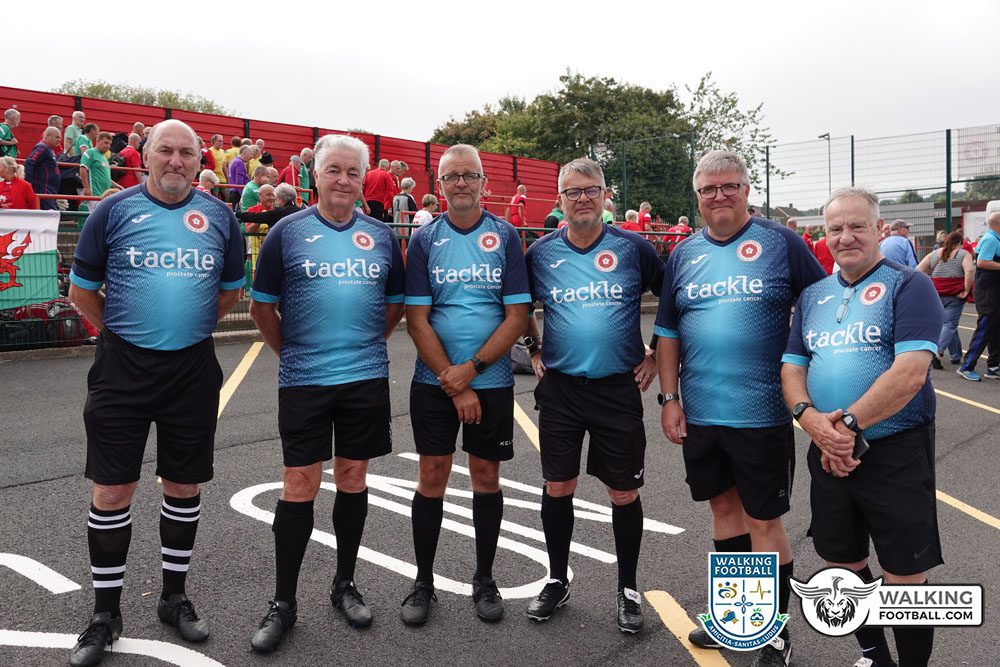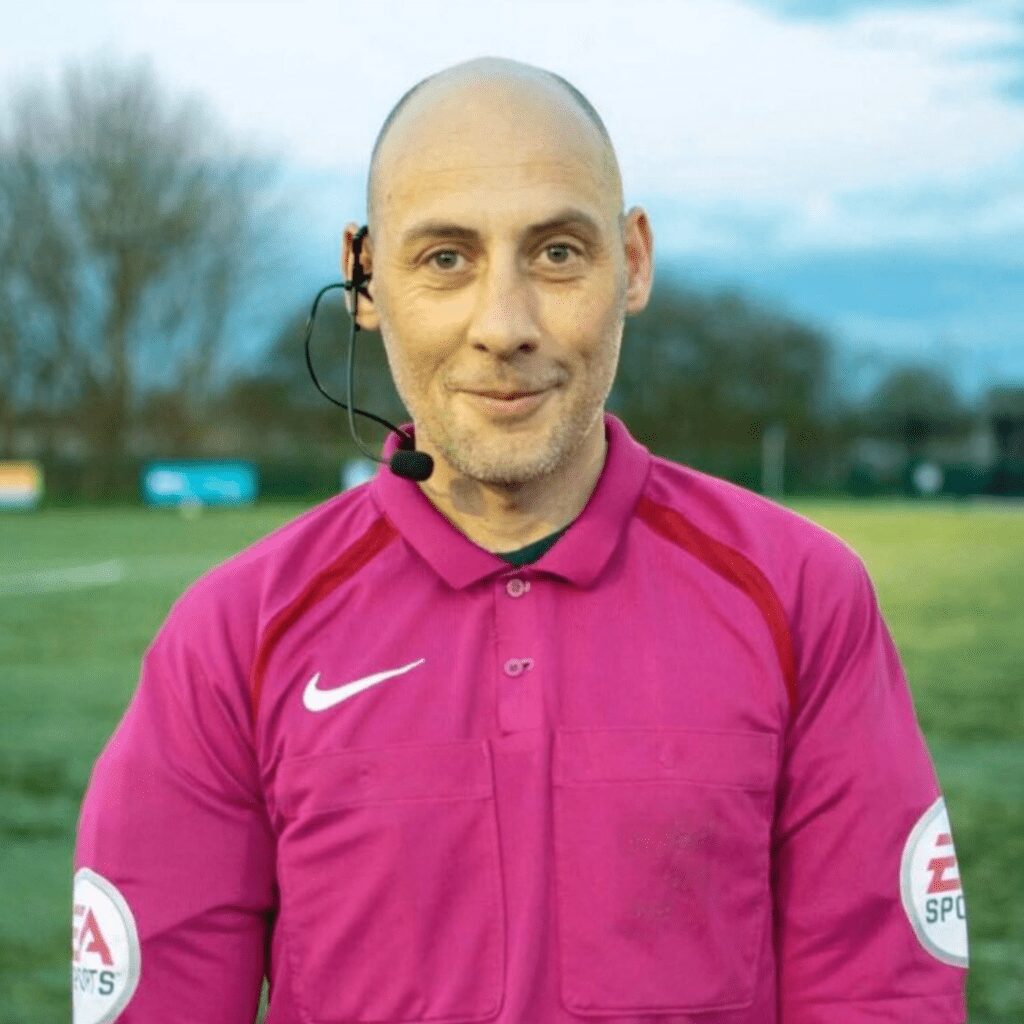With no referee, there is no game, and often the importance of a referee is overlooked. Fen Regis Trophies spoke with three grassroots football referees about their experiences, why they became referees and what advice they would give to anyone considering becoming one.
Stuart Craig, Stuart Cave, and Grant Moody have more than 60 years of grassroots refereeing experience between them. They have forgotten more about being a referee than the average person in the street will ever know, seeing both the good and not-so-good sides of the role.
Stuart Craig – Lincolnshire FA – 20 Years Refereeing
Stuart, like many referees at grassroots level, has also been a player and a coach – giving him an all-rounded insight into the game. Initially refereeing kids, Stuart now exclusively referees walking football, a variant of the game traditionally played by those aged 50 and over.
That means that the Lincolnshire FA referee has great experience in dealing with players of all ages. He says that while refereeing children is a challenge, it is the wily old foxes that you have to watch out for.
“When you referee kids, it is what it is,” said Stuart. “Usually, the kid has done something out of a lack of control or complete innocence.
“Once you get to the most experienced of veterans, that have played the game at a good level for 20 years, they know every trick in the book.
“You see a little bit of it in walking football. You see a few of them pulling shirts on the blind side of the referee trying to get away with it.”
Though dealing with players and coaches is one of the big challenges of being a referee, Stuart says that maintaining concentration across multiple games is the most testing. Often officiating multiple games one after the other, referees will rack up some serious mileage over the day.
“I find that the hardest thing is maintaining concentration. For example, the other week I was refereeing at an international tournament for walking football. I started at 10am and finished at 5pm with a five-minute break between each game.
“There is no way in the world that your performance won’t deteriorate over that time.
“I don’t think you can possibly be as sharp and effective in game four as you are in game one. I just don’t think you can. Players wouldn’t be, so how can you expect the same as a referee?”
He added: “Referees do not want to spoil the game. They do not want to make mistakes that spoil the game. It’s not what any referee sets out to do.
“The more tired you are the more likely you are to make a mistake. We cover a good distance, even in walking football I’ll cover five or six kilometres in a game.
“If you multiply that by five or six games back-to-back and you’ve done some mileage by the time a day finishes.”
Having been involved in the game for so long, Stuart understands that more often than not, what happens on the pitch stays on the pitch.
“The minute the final whistle goes,” he said. “They shake your hand and say ‘thank you ref, I’ll see you in the bar and buy you a beer!’”.

Grant Moody – London FA – 16 Years Refereeing
Grant referees in the Brentwood Sunday League and Thurrock & District Association Sunday League, picking up the whistle because he “was unable to play any longer and wanted to stay in football”. Though the London referee spends most of his time officiating in humble surroundings, he has had the privilege of gracing White Hart Lane, the old home of Tottenham Hotspur, as a linesman and being the so-called ‘man in the middle’ at Charlton Athletic’s The Valley.
Despite all of that, Grant admits that he came close to deciding to hang his whistle up after a particularly difficult game.
“After getting so much dissent after a game last season I laid on the ground and questioned why I’m still refereeing.
Grant added: “It would be great if they could make a course for managers to watch as part of the registration, to show why a referee may make certain decisions.”
Coming out of the game simply isn’t an option for Grant, however, as he loves that he remains involved in football with the good far outweighing the bad. Though there is much room for improvement, especially where behaviour towards referees is concerned, this referee still looks forward to his next match.
“Being part of the great sport that is football and being able to be involved with and watch a good game of football is what’s most enjoyable.”
When asked what advice he would give to anyone looking to get involved he said it is important to seek the guidance of experienced referees.
“Get a mentor and ask them to watch you,” he said. “Join a referee society, as without my one I would not have lasted as long as I have, and watch experienced colleagues where possible to help pick up good habits.”

Stuart Cave – Northamptonshire FA – 29 Years Refereeing
As well as having been a referee since the age of 16, following in his father’s footsteps, Stuart is also a scout, coach, and chairman of his local side Peterborough City FC. He is a man that is just as much woven in the fabric of his local grassroots football scene as the pitches themselves.
There was no such thing as mini-soccer when Stuart first blew a whistle. Instead, seven and eight-year-olds would play on the same size 11-a-side pitches, and 11-a-side goals, as the adults. That has of course all changed, with the size of pitches gradually increasing with the age of the players, and that is not the only thing that has changed according to the Northamptonshire referee.
“I don’t remember getting any abuse from parents when I used to do kids’ games,” said Stuart. “But we do now.
“I don’t remember any. No incidents stand out. Nothing ever stands out. I think it’s got worse.”
Stuart believes that an intensified focus on referees, brought about by social media and television, is partly to blame for what he sees as an increase in abuse aimed towards referees.
“Social media and not just social media, but television as well. Referees are highlighted a lot more now than they used to be.
“Back in the 90s, you probably only heard of one referee in the Premier League or two maybe, and you didn’t know your local referees and all that sort of stuff. But now we’re highlighted.”
Though Stuart has wound down his refereeing commitments in recent years, focusing on other areas, he climbed as far as running the line in the top level of non-league football – now known as the National League. The travel demands were ultimately too much, however, and he decided to operate exclusively in local grassroots football.
In his opinion, it is his experience of having played and coached the game that earns him the respect of other players and coaches, as he knows “what a tackle is” and when a player is “being sneaky”.
“I enjoy being involved in football,” said Stuart. “I’m still meeting new friends, I’m networking and meeting people, but I enjoy giving people a good game of football.
“I want people to enjoy their game of football. I don’t want them to worry about a referee who’s going to punish them every two minutes. I’m a big believer of play on.
“Because I used to play football, I know what a tackle is. I know when you’re being sneaky, and it comes from being an ex-player. That’s what they like.
“Us referees who are ex-players can see when it’s a push in the back and we know when it’s a shoulder barge. We know when you trip someone, and we know when you’ve gone for somebody.
“It makes it a lot easier being an ex-player and manager to referee than it just coming straight out and being a referee, and I got a lot more respect for it as well.”
Support for Referees
It is no secret that, currently, there is a shortage of referees in the grassroots game. With county FAs calling out for willing volunteers of all ages to put their hands up to ensure that games can take place, it has never been more important for coaches, players, and spectators to show their support.
All referees can seek support and guidance from Ref Support UK, which is a charity committed to the support of referees in all areas. Any referee, or those interested in becoming a referee, can contact Ref Support UK via their website as well as through their Facebook and Twitter pages.
Anyone keen to become a referee should head over to the FA’s referee course page where you can find information on how to enrol on a course and begin your refereeing journey.
Referees allow players, coaches, and spectators to enjoy the beautiful game and are an integral part. Always be appreciative of the referee, especially if your game is their third or fourth of the day and instead of heading home to put their feet up they are giving you their time.
